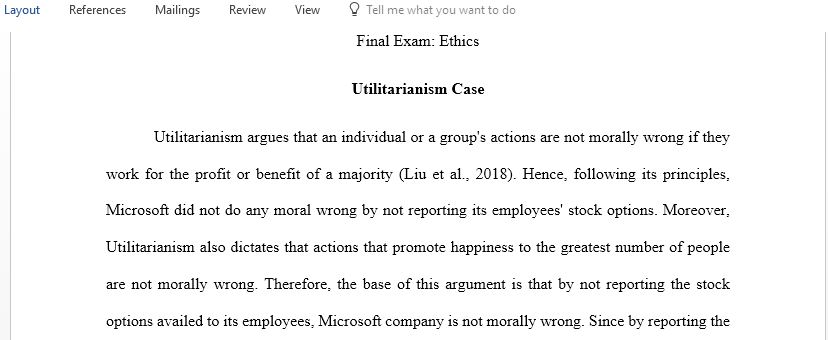Make a utilitarian case that there is nothing inherently or intrinsically immoral with deception
The final exam consists of 6 short essays. Each should be about 1/2 page.
1. Essay: (5 pts) Make a utilitarian case that there is nothing inherently or intrinsically immoral with deception. Let’s suppose Microsoft not reporting the stock options it was offering to its employees as an expense was a form of deceit. According to the Utilitarian, Microsoft’s actions, even if deceitful, were not necessarily immoral. Deception is, in many cases, immoral. But, in some cases, not. If the deceitful act maximized overall utility, it was morally justified. According to the Utilitarian, there is nothing inherently or intrinsically immoral with deception. Essay: (5 pts) Make a utilitarian case that there is nothing inherently or intrinsically immoral with deception. What’s the utilitarian argument for this? Then, raise an objection to this argument. Surely, deception must be inherently immoral. So, something must be wrong with the utilitarian argument. What’s the problem with the argument?
2. In contrast to what the Utilitarian says about deception, the deontologist says deception is always immoral. It is necessarily immoral. If not reporting the stock options as an expense was deceitful, Microsoft was in the wrong, period. Deception is inherently or intrinsically immoral. We know this because it violates the categorical imperative. All of morality boils down to one moral rule—the categorical imperative. An action is approved if it accords with the categorical imperative. It is unapproved if it does not. Essay: (5pts) State the categorical imperative State how deception violates the categorial imperative. Raise one objection to idea that all of morality boils down to one moral rule— the categorical imperative.
3. According to the virtue ethicist, to act morally is to act in ways that promote the moral virtues. But, to do that, we need to know what the virtues are. That is, we need a way to distinguish the virtues from the vices. For that, we turn to the doctrine of the mean. Essay: (7.5 pts) State the doctrine of the mean According to the doctrine of the mean, laziness is a vice and not a virtue. Explain this fully. Provide argumentation that the doctrine of the mean does not always correctly tell us which characteristics are virtue and which are vices. Give an example of something that is clearly a vice but the doctrine of the mean tells us it is a virtue. Give an example of something that is clearly a virtue yet the doctrine of the mean tells us it is a vice.
4. The Marxist claims that capitalism is based on exploitation. Essay: (7.5 pts) State the argument that capitalism essentially relies on exploitation. Then, push back against this argument. Raise an objection to the argument.
5. One can make the case that cigarette companies selling a harmful and addictive product like cigarettes for profit can be morally justified. Essay: (7.5 pts) Make a case that selling a harmful and addictive product like cigarettes for profit can, under the right circumstances, be morally justified. State the conditions that would have to be met for this to be the case. Raise an objection to your case. Surely, even if all the conditions you laid out are met, selling a harmful and addictive product like cigarettes cannot be morally justified.
6. The Houston Astros won the 2017 World Series. But, allegedly, the Astros players, throughout the entire 2017 MLB playoffs, cheated by using cameras to steal signs from the opposing teams. In early 2020, a former Astro player, Mike Fiers, blew the whistle on his former teammates and exposed them as cheaters. Essay: (7.5 pts) Provide an argument that Mike Fiers blowing the whistle on his former teammates and exposing them as he did was unnecessary. Compare the Astros case with the Ford Pinto case. What is an important difference between the two cases such that in one case whistleblowing was necessary but in the other not? Raise an objection to your argument that Mike Fiers blowing the whistle was unnecessary. What’s a reason to think that what Fiers did was necessary?
Answer preview for Make a utilitarian case that there is nothing inherently or intrinsically immoral with deception
Access the full answer containing 1138 words by clicking the below purchase button.

